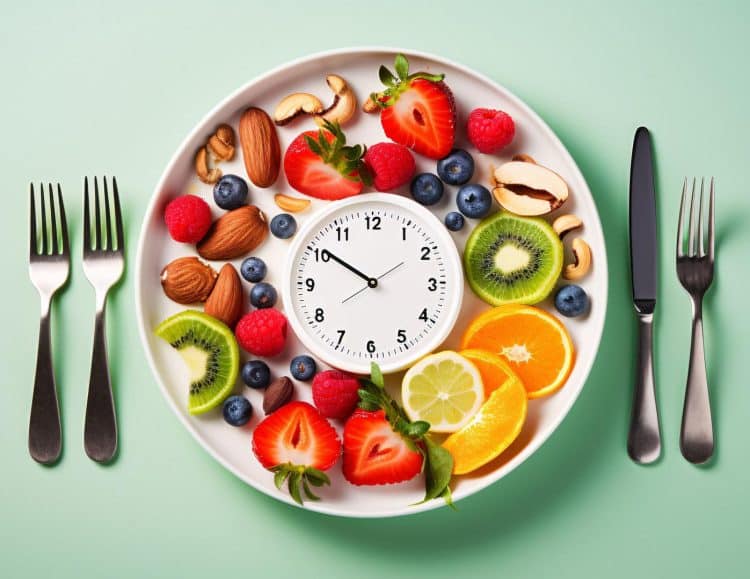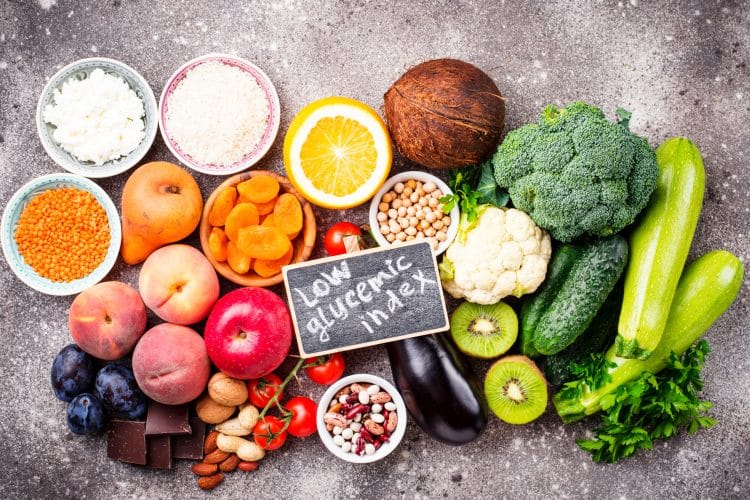A Drive Research survey found that at least 74% of Americans drink coffee daily, and around 9% drink over 5 cups daily. Starting a day with a cup of coffee is a ritual for many people. The rich aroma of coffee and its robust flavor give them the revitalizing kick they need to power through the day.
But did you know that a medium-sized apple can give you more energy minus the caffeine-induced side effects? An apple a day, indeed.
Fruits offer various flavors, nutrients, and benefits. This article is a comprehensive guide to including fruits in your fasting routine.
Will This Break Your Fast?
Find out if coffee, tea, sweeteners, and other drinks break your fast based on your specific fasting goals.
Check What Breaks My Fast →What is Fruit Fasting?
A fruit fast is a flexible dieting technique that can be practiced in several ways, including one-day, three-day, one-week, and extended fruit fasts. A strict fast restricts any calorie consumption. However, fruit fasts are less restrictive and allow fruit consumption during the fasting window.
This can also be considered a mono diet, as it allows the consumption of only one food group.
How to Fruit Fast?
Preparing ahead can ensure you have a safe and successful fasting experience. Although fruit fasting does not involve completely abstaining from food, there are several things to consider before you start your fast.
Things To Consider Before Food Fasting
Here are the things you need to consider before fasting.
Consider Your Motivations For Fasting
Many people start fruit fasting to detoxify, lose weight, or simply give their digestive system a break. Your motivation may also be religious, cultural, or ethical. Your pantry might be empty. You could be too lazy to restock or cook. Whatever drives you, setting your objective is important to reaching the goal.
Consult a Health Professional
Before starting a fruit fast, you must consider various factors, like your current health status and lifestyle. Your body is deprived of several nutrients on a fruit-only diet. For this reason, fruit fasting is not recommended for children or expecting mothers. It is crucial to consult a health professional to determine if this is the right fasting regimen for you.
Get Rid of Processed Food and Sugar From Your Pantry
One way to commit to fasting is to eliminate anything that can hinder your fasting journey. This includes alcohol, cigarettes, junk food, sugary snacks, fried snacks, sugary beverages, and other foods you aren’t allowed to eat while fasting.
Gradually Reduce Your Intake
Going cold turkey can trigger withdrawal symptoms. Skipping coffee or sugar all at once may cause headaches and/or fatigue. A week or so before fasting, gradually cut out the items and habits you aren’t allowed to indulge in. This will help your body get accustomed to the new routine.
Do not have any processed or spicy food the day before fasting. Eat small, balanced meals before fasting.
What to Eat While Fruit Fasting
You have an orchard of choices. You can pick any fruit based on your health conditions or preferences. Here are six recommended fruits that you can eat while fasting:
- Melons: Melons like watermelon, honeydew, and cantaloupe are hydrating and detoxifying. With minimal calories, they contain many essential nutrients and improve your digestive system.
- Grapes: Like melons, grapes also keep you hydrated while fasting. They also improve overall health.
- Blueberries: With one of the highest antioxidant levels among all fruits, blueberries are said to be beneficial for heart health, blood sugar levels, blood pressure, and brain function.
- Pomegranate: Full of fiber, natural sugars, and vitamins, this hydrating fruit can keep you fueled for hours. It can also help with kidney stones. [1]
- Apples: Apples are high in soluble fiber, which is good for your gut health. Although around a quarter of its volume is just air, this is one of the most filling fruits that keeps hunger pangs away.
- Dried Fruits: Dried fruits not only have high sugar levels but also nutrients. Rich in antioxidants and fiber, a cup of dry fruits has more vitamins and other micronutrients when compared to a cup of fresh fruits. For better digestion and to absorb the nutrients more effectively, soak the dry fruits overnight before consuming them.
You can choose to fruit fast by consuming the same fruit on all fasting days (“the one-fruit fast”) or choose a mixture of these fruits (“the any-fruit fast”).
What Foods To Avoid While Fruit Fasting
You must abstain from anything besides fruits, dry fruits, nuts, seeds, and raw veggies. This includes dairy, meat, eggs, grains, cooked food, etc. Unlike other fasts, this fasting method doesn’t allow the consumption of zero-calorie drinks like coffee or diet soda. Water is the recommended go-to beverage for hydration while fruit fasting.
How Much Fruit Should You Eat?
The HealthBoard suggests two fruit meals a day while fasting. This is usually the first meal of the day.
- If you follow the one-fruit fasting plan, limit your intake of acidic fruits like oranges, strawberries, lemons, pomegranates, and apples. They can trigger increased stomach acid secretion, and you might experience unpleasant symptoms like bloating and heartburn. The acid in the fruits is also bad for your teeth. It can accelerate dental erosion and cause increased sensitivity.
- If you follow the any-fruit fasting plan, be careful how you mix several fruits. Never mix melons with other fruits. Melons are digested faster as they have more water content. When mixed with other fruits, they tend to cause indigestion. Combining acidic fruits like apples with sweet, starchy fruits like bananas is a recipe for nausea and headaches. Mix acidic fruits with other acidic fruits. Similarly, mix sweet fruits with other fruits of its kind. If you are unsure whether your fruits will go well together, simply have one type of fruit in one meal and save the other for the next.
- You can also have raw vegetables, nuts (like almonds and walnuts), and seeds (like chia seeds, pumpkin seeds, and flaxseeds). Vegetables are avoided as they are high in insoluble fiber and may strain your digestive system. You can make a broth out of the vegetables or a salad. Do not fry or boil it. Try to have them raw or slightly streamed. Whether you prefer to have them or not depends on your purpose for fasting or personal preference.
Some Tips for Fruit Fasting
Here are some helpful fruit fasting tips:
- Try to eat the fruits raw or slightly steamed. Studies suggest that certain nutrients are easily lost when food is cooked or boiled. Raw fruits are also easier to digest. [2]
- Choose fruits with a lower glycemic index because they are less stressful for your body. Fruits with a higher GI rapidly increase and decrease your blood sugar levels and strain your body. This also hinders detoxification.
- Try to buy locally grown, organic fruits if they are available. They are fresher and healthier.
- Every fruit has its prime time. Eating under-ripe or overly-ripe fruit can only cause digestive issues. There are several visual and other sensory clues to determine whether a fruit is fresh. Research them. Eat a fruit at the right stage of its ripeness.
- Eat the fruits as they are or make smoothies. Do not juice them, as it filters out the fiber and some nutrients.
- Stay Busy. Like Dr. Fung says, hunger is in the mind. The more you think about it, the worse it seems. In reality, craving only hits you periodically, most often during your regular meal times. Although hunger during fruit fasting is not as intense, the effects of reducing the quantity of daily food intake can hit you hard. Keeping your mind busy can help you ride the waves of hunger smoothly. Do something that interests you and distracts you from your hunger, or sip water slowly when you feel hungry. [3]
- Stay hydrated. Drink lots of water.
- Don’t bother with calorie counting. Most fruits are very low in calories. You will automatically consume less than your TDEE as fruits have a higher satiety index.
- Practice mindful eating. It not only prevents binge eating but also helps manage hunger cravings.
- Rest and get enough sleep. Although many people may argue that eating fruits gives you energy to power through high-intensity exercises, you should take it easy. If your goal is to lose weight, get moderate amounts of exercise. Otherwise, just walk for 30 minutes after each meal and rest whenever you feel like it.
- Get a fasting friend. Fasting alone can be a test of your self-control. It is hard to hold yourself back when people around you are eating their normal meals. It might be tempting to throw in the towel and tell yourself it’s okay to have one cheat meal. For the record, it’s not. Having a fasting friend who is on the same path as you can provide moral and emotional support.
- Listen to your body. Even if you think your health is top-notch, no one can predict how your body will react to a changing diet. If your body shows signs of any extreme side effects, stop. Do not push yourself to do something your body isn’t ready for.
How To Break a Fruit Fast
Have a small, rejuvenating meal to break your fast. Soup, lemon juice, or watermelon juice are good options to break a fast.
Gradually reintroduce other foods post-fasting. Your stomach gets used to smaller amounts of food, and suddenly eating a large meal may overwhelm your stomach and cause nausea and other digestive issues. Have smaller meals that are easy to digest before resuming your regular diet.
Benefits of Fruit Fasting
Most of the benefits of fruit fasting are associated with the benefits of fruits. Fruits are nature’s colorful treasure trove. There are innumerable benefits to eating them.
Detoxification
Most fruits contain antioxidants like vitamin C, E, lycopene, beta-carotene, anthocyanins, flavonoids, etc. They reduce the damage caused by the toxins in our bodies. These toxins are either externally or internally produced during metabolic functions. Our body does have an internal mechanism (involving the liver, kidneys, gut, and skin) to flush out the toxins. However, with the wrong eating habits, our organs can get overwhelmed. While fasting, there is less strain on these organs. The antioxidants in the fruits eliminate the toxins without much stress on our digestive system and liver. Detoxification leads to less chronic inflammation, a better immune system, healthier skin, increased mental clarity, etc. [4]
Weight Loss
As mentioned earlier, a fruit diet usually results in a calorie deficit. Although most of the weight lost during a fruit fast is water weight, incorporating fruits into your regular diet helps with weight management in the long term.
Check Out: How To Lose 5 Pounds in a Month: 15 Healthy and Effective Tips
More Benefits
Fruits are gifts that keep giving. The wide array of nutrients in the fruits gives them a plethora of benefits, like:
- Reduced risk of obesity
- Reduced risk of cancer
- Improved gut health
- Improved mental health
- Reduced risk of neurodegenerative disorders like Parkinson’s and Alzheimer’s [5, 6]
- Improved blood sugar levels
- Increased energy levels
- Increased cognitive function
- Hydration
- Better heart health
Also Read: Expert Tips on How to Get the Most Out of Your Fasting Routine
Risks of Fruit Fasting
Fruit fasting comes with its own set of risks. Here are a few:
Nutrient Deficiency
The biggest pitfall of fruit fasting is nutrient deficiency. While fruits are rich in nutrients, they do not have all the nutrients that our body requires, and if they do, the quantity is insufficient. During a fruit fast, you cannot meet your daily proteins, vitamin B-12, calcium, iodine, iron, and omega-3 fatty acids targets. While missing them for a few days does not do much harm, fasting for more extended periods can make you susceptible to malnutrition and related problems. This fasting technique is not sustainable and is not recommended for more than a week.
Blood Sugar Levels
All fruits have a considerable amount of sugar. Fruits with a higher GI will increase your blood sugar levels rapidly. Soon, the levels will drop, and your hunger pangs will start. Eating such fruits can put your sugar levels on a rollercoaster. The only way to control it is to manage your portions. However, portion control is more challenging when you are fruit fasting. Normally, the sugar content in fruits is not a problem as they contain other beneficial nutrients. However, if you want to lose weight or are diabetic, it might spell trouble for you.
Other issues
Fruit fasting for more extended periods can worsen existing kidney and pancreatic problems. If you go overboard on fruits, it might lead to weight gain. Consuming too many fruits can also upset your digestive system.
Check Out: How To Prevent Diarrhea While Fasting
FAQs
Can I have fruits on a keto diet?
In a strict keto diet, you cannot have fruits as they contain sugar. However, you can have small portions of keto-friendly fruits like strawberries and avocado.
Does fruit fasting cause weight loss?
Yes. Factors including genetics, age, activity levels, gender, and total caloric deficit might affect results. Plus, most of the weight you lose is water weight.
How many apples can I have in a day?
One to two apples a day are safe to consume. More than that, it can lead to diarrhea and bloating.
Is fruit fasting good for diabetic patients?
No. People with diabetes should avoid fruit fasts. If they decide to fast, doing it under medical supervision is better.
Is fruit fasting the same as a fruit diet?
Fruit fasting and a fruit diet have similarities, but they are not the same. Fruit fasting is short-term, whereas a fruit diet is a long-term approach.
Final Note
Fruit fasting can help you detoxify and promote weight loss. However, it is beneficial only if it is observed within limits. Longer periods of fruit fasting can lead to health issues. Make sure you do not have any existing health problems that can be aggravated while fasting. Consult a health professional to determine if this is beneficial for you.
References
Fitness Volt is committed to providing our readers with science-based information. We use only credible and peer-reviewed sources to support the information we share in our articles.
- Nirumand MC, Hajialyani M, Rahimi R, Farzaei MH, Zingue S, Nabavi SM, Bishayee A. Dietary Plants for the Prevention and Management of Kidney Stones: Preclinical and Clinical Evidence and Molecular Mechanisms. Int J Mol Sci. 2018 Mar 7;19(3):765. doi: 10.3390/ijms19030765. PMID: 29518971; PMCID: PMC5877626.
- Onyeka UE, Ibeawuchi ON. Loss of food nutrients orchestrated by cooking pots: a common trend in developing world. J Food Sci Technol. 2021 Aug;58(8):2906-2913. doi: 10.1007/s13197-020-04792-w. Epub 2020 Sep 29. PMID: 34294952; PMCID: PMC8249525.
- Fung, J., & Moore, J. (2016, January 1). The Complete Guide to Fasting.
- Rahaman MM, Hossain R, Herrera-Bravo J, Islam MT, Atolani O, Adeyemi OS, Owolodun OA, Kambizi L, Daştan SD, Calina D, Sharifi-Rad J. Natural antioxidants from some fruits, seeds, foods, natural products, and associated health benefits: An update. Food Sci Nutr. 2023 Jan 13;11(4):1657-1670. doi: 10.1002/fsn3.3217. PMID: 37051367; PMCID: PMC10084981.
- Slavin JL, Lloyd B. Health benefits of fruits and vegetables. Adv Nutr. 2012 Jul 1;3(4):506-16. doi: 10.3945/an.112.002154. PMID: 22797986; PMCID: PMC3649719.
- Del Río-Celestino M, Font R. The Health Benefits of Fruits and Vegetables. Foods. 2020 Mar 23;9(3):369. doi: 10.3390/foods9030369. PMID: 32209967; PMCID: PMC7143647.
Tip: If you're signed in to Google, tap Follow.













